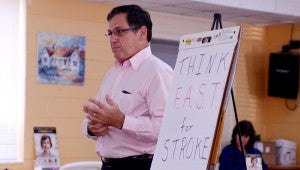Troy Regional Medical Center hosts stroke seminar
Published 2:00 am Friday, May 22, 2015

Messenger photo/Courtney Patterson
Dr. Leonardo Nasca, TRMC ER director, speaks at a stroke seminar at the Colley Senior Complex, providing details on signs of a stroke and ways to prevent them.
Troy Regional Medical Center hosted a stroke seminar at the Colley Senior Complex to allow the community to learn more about the warning signs of a stroke, the risks and how to prevent serious damage from a stroke.
“The most important thing is to get to the hospital fast and to treat it fast,” said Pam Ray from TRMC who facilitated the event.
Dr. Leonardo Nasca, TRMC ER director, and Dr. Micky DiChiara, Pike Internal Medicine, were the guest speakers at the seminar, telling about the best ways to react to a stroke. Nasca introduce the acronym FAST, meaning face, arm, speech and time. Signs of a stroke may include numbness or droopiness of the face, weakness in the arm or other parts of the body or slurred speech. If any of those occur, time is of the essence and it is important to dial 911.
Dr. Nasca explained that 93 percent of people who experience a stroke noticed the signs; however, most people do not react quickly.
“By the time somebody else sees it or we decide to go to the hospital it’s too late,” Nasca said. “That’s the most important thing we need to tell people. If they recognize it, they should be calling 911 to get them to the closest emergency room or stroke center.”
TRMC is a stroke center, and patients are able to be cared for in the incident of a stroke.
DiChiara described ways that someone can prevent a stroke or recover from them. He said things like being active is important, and any little thing will help.
Also he said that rehab is important after someone has a stroke. A stroke can cause loss of movement, but it can be rectified.
“The more you do, the more that will come back,” he said.
For more information, visit www.strokecall911.com.
“We have been so blessed at Troy,” Ray said. “We want to give them the best care, but it is also good to prevent the situation.”




